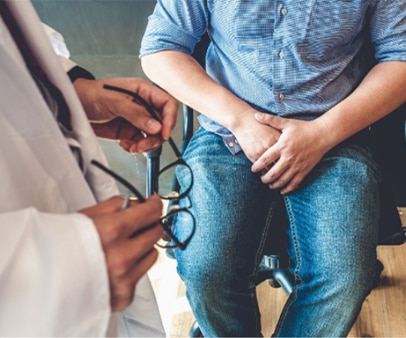Hernias During Pregnancy
Pregnancy is an exciting and beautiful time in a woman’s life. A time that brings tremendous change—not only in the welcoming of a new addition to the world, but changes and transformations to a woman’s body, and its innerworkings, overall.
What is a Hernia?3
A hernia occurs when an organ or fatty tissue squeezes through a weak spot in surrounding muscle or connective tissue. They often occur in weaker areas—like the abdominal wall or groin—and can range from no/mild discomfort to extremely painful (and require emergency treatment). Most hernias are external, which means the tissue is pushing through the abdominal wall toward the outside of the body. This often creates a bulge that you can see. But a hernia can also be internal, which means that it remains inside the body (within the abdomen).
Why Is Pregnancy a Risk Factor for Hernias?
Pregnancy is associated with increased pressure in your belly as the baby grows. It’s also associated with stretching and thinning of the muscles in your belly, which may allow part of the intestine or other tissue to push through an opening in the abdomen or groin.2 These two factors, increased abdominal pressure and weakened muscles, can both lead to a greater risk of developing a hernia.4
Common Hernia Types in Pregnancy
The most common types of hernias in pregnant women are inguinal (inner groin), femoral (outer groin), and umbilical (navel).5
- An inguinal hernia occurs when your intestines protrude through your lower abdominal wall or inguinal canal (the area that holds your uterus). Being pregnant can weaken the abdominal muscles and cause increased pressure inside your abdomen. You may notice a bulge on either side of your pubic bone where your thigh and groin come together which becomes more obvious when you're upright, especially if you cough or strain. It may seem to go away when lying down, but you may be able to see it clearly when you cough, stand, or strain.6
- A femoral hernia protrudes into a different area of the groin called the femoral canal—which lies just below the inguinal canal. A femoral hernia can happen when the femoral canal stretches, which may occur during pregnancy due to weight gain around the hips and upper legs.7 You may notice a lump around the crease of the groin or into the upper thigh. As with an inguinal hernia, it may seem to go away when lying down, but you may be able to see it clearly when you cough, stand, or strain.7
- While umbilical hernias are most commonly found in infants, it is possible for adults to get them, too. A bulge or soft swelling near the navel/belly button is a common sign of an umbilical hernia, and like inguinal and femoral hernias, may be more noticeable while coughing, laughing, or straining movement.3
Other Factors That Increase the Risk of a Hernia During Pregnancy5
If you're pregnant and have certain underlying health conditions, the risk of developing a hernia increases. Some of these conditions include:
- Obesity
- Previous abdominal surgery
- Multiple pregnancies (twins, triplets, etc.)
- Chronic coughing conditions
- Chronic constipation
- Frequent lifting of heavy objects
Symptoms of a Hernia During Pregnancy4
Hernias in pregnant women do not always cause obvious symptoms. For those who do have symptoms, you may feel a lump when you lie down or push on the area. This area may occasionally become sore, particularly if you have been active.
If you are unable to push the hernia lump back into your body while lying down, then the hernia may be trapped or incarcerated. If you become nauseated, vomit, and/or the bulge starts to turn red, purple, or dark, then the hernia may be strangulated. In either of these scenarios, you should talk to a medical professional immediately.
Is This Hernia Pain or Something Else?
- Ovarian Conditions: Women are less likely to suffer hernias compared to men. And, because hernias in women are often small and internal, they’re oftentimes misdiagnosed as ovarian cysts or other ovarian conditions. If a woman is continually suffering from abdominal or groin pain and other explanations have been ruled out, a hernia may be the culprit. Consult your doctor to be sure.8
- Diastasis Recti: Diastasis recti is a common condition in pregnant and postpartum women that usually develops in the third trimester. It occurs when the “six pack ab muscles” (rectus abdominis muscles) separate due to stretching from pregnancy, causing a bulge at the midline from increased abdominal pressure. Most people don’t notice diastasis recti until the postpartum period and/or it usually resolves itself within eight weeks of delivery. It can be repaired with special exercises designed to help close the separation, or in more severe cases, may require surgery. Be sure to talk to your doctor about your concerns.9
Timeline for Hernia Treatment4
There is no clear “best time” to get your hernia repaired. The decision on when to get your repair depends on the size of the hernia, severity of any associated symptoms, and an honest discussion with your doctor.
Overall, there are three common times when you can get your repair:
- During pregnancy: Repairs can be done while you are still pregnant. This is more common for symptomatic hernias or hernias that become strangulated. The timing of your procedure will vary based on when the hernia occurred and the preferences of your hernia surgeon, obstetrician, and anesthesiologist.
- During a C-section: If you have a C-section, the hernia can sometimes be repaired at the same time.
- After childbirth: For smaller hernias or hernias without any symptoms, most surgeons will recommend you keep an eye on the hernia until after childbirth. Generally, these procedures will be delayed until at least 5-8 weeks after you give birth, but you can wait longer if the hernia is stable.
Types of Repair Options
Depending on the size and location of your hernia, your doctor may recommend a hernia repair with or without mesh. Hernia repairs without mesh are often only done if the hernia is small.
If your doctor recommends a mesh, there are some mesh options that are designed to stay in your body permanently to support the repair. Others are made of natural materials that will absorb over time, leaving only your own tissue. You should discuss these options with your doctor to see what option may be right for you.
The guidance provided in this article follows general rules that should be discussed with your doctor. This article is for informational and educational purposes only. It does not substitute for medical advice. If in doubt, always consult your doctor.
Related Articles
Join the HerniaInfo.com community! Get notified about our latest articles and updates on all things hernia as they become available.


